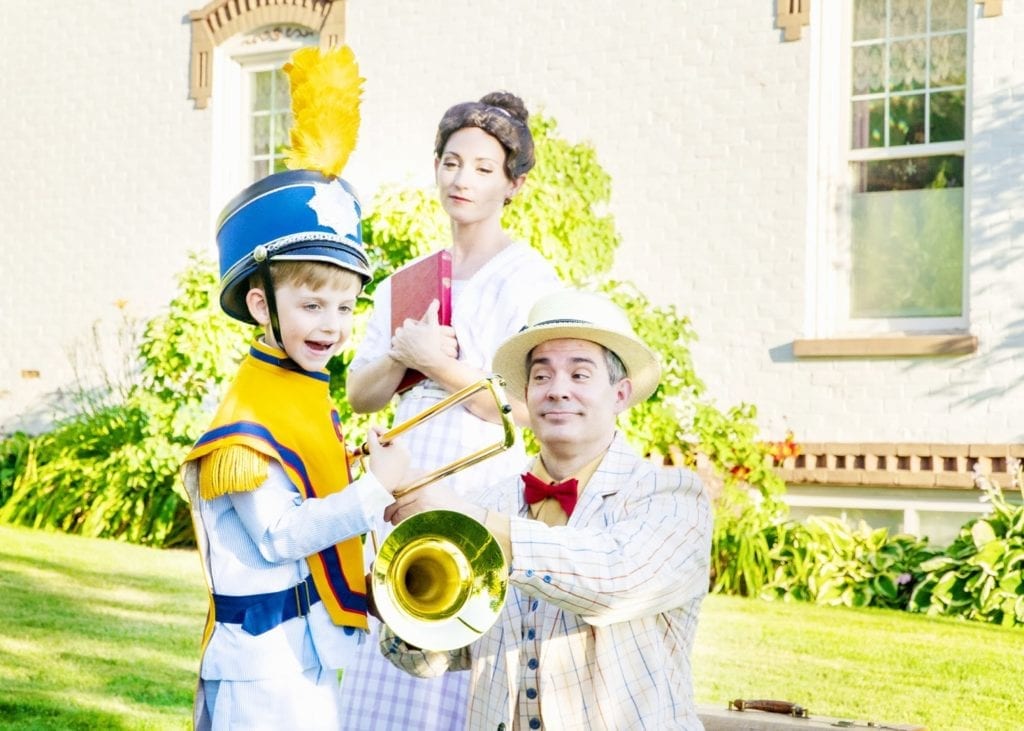OREM — In uncertain times, there is something comforting about a show like The Music Man. For the past five months, Americans have had to deal with lockdowns, riots, closed schools, unemployment, and other turmoil. But watching Harold Hill bamboozling the people of River City again makes life feel almost normal. That sense of normalcy is exactly what people need in 2020, and it is why I can unconditionally recommend the SCERA’s current production.

Michael Carrasco directed this production with a focus on the emotional core of the story. While the romance between Marian and Harold was not obvious in the first act, it did build to a satisfying climax in the footbridge scene. The staging of “‘Til There Was You” was a triumph as Marian reached the center of the bridge for the first time to kiss Harold at the song’s crescendo. Carrasco also had little creative twists that brought something unique to a play that often does not give directors much latitude in staging. For example, his choice to have the salesmen in “Rock Island” provide on-stage percussion by tapping a metal container, hitting suitcases, and pounding a broom handle on the floor of the set piece added to the illusion that the scene took place on a train.

Allison Books brought stellar musical direction to The Music Man. The crisp diction and vocal power of “Iowa Stubborn” set the tone for the rest of the show. The “Lida Rose” and “Will I Ever Tell You” number was a excellent blending of two vocal styles that symbolized how music had brought disparate parts of the town together.
As Marian Paroo, Shannon Eden has a believable relationship with her on-stage mother (played by Tina Fontana). The bickering during “The Piano Lesson” and the tension of between an adult daughter and her overbearing mother provided Marian with a history that grounded the character in reality. Eden also has a strong vibrato in her soprano voice, which gave Meredith Willson‘s songs a classical feel that elevated them above typical musical theatre fare. Richie Trimble played Harold Hill with the smoothness that audiences expect from the character. Trimble glides through his rhythmic monologue in “Seventy-Six Trombones” and almost sneaks up on characters (like Mayor Shinn) during the non-singing dialogue.

The real star of this production, though, is Chantelle Wells‘s choreography. The bits of ballet infused into “Seventy-Six Trombones,” “Shipoopi,” and “Marian the Librarian” were delightful treats that made these old workhorse numbers spring to life with grace and vibrancy. I was also pleasantly surprised by the addition of background dancers in “Sadder But Wiser Girl.” At first I feared it would detract from the leading actors in the song, but the choice brought some visual variety to the song and helped use up the vast expanse of the SCERA Shell stage. Finally, I have not seen such a joyous “Shipoopi” in years. Adding the children and most of the townsfolk to the number turned it into a celebration of life and community.
The designers for this production were effective in transporting the audience back to pre-World War I America. The convincing faux brickwork and gabled buildings designed by Shawn M. Herrera were perfect echoes of the middle America architecture of the period, and the patriotic bunting decorating parts of the set were a nice touch. Herrera also created a superb design for Marian’s house, with half of the set on hinges so it could open and serve as a surprisingly large living room for the interior scenes, or close to provide space for the porch scenes. Kelsey Seaver assembled wonderful costumes for every cast member. The diversity of patterns, with the occasional splash of solid color was visually appealing and provided a unifying look to the townsfolk without making them look uniform.

This is normally the point in a review where I mention the minor imperfections that prevented a production from reaching perfection. While these flaws are there, cataloging them seems unnecessary. This is a better show than most amateur productions of The Music Man, and SCERA audiences are forgiving of the things that critics nitpick about.
Plus, any list of flaws would undermine from the show’s greatest strength: its comfortable familiarity. Mayor Shinn still fumbles over his words. Tommy Djilas is still getting into trouble. The Wells Fargo wagon is still a-comin’ down the street. This is The Music Man that audiences have grown to love for over 60 years, and the connection to a simpler time—and the pre-pandemic memories it stirs—make the show fully satisfying.
[box]The SCERA production of The Music Man plays nightly (except Wednesdays and Sundays) through August 21 at 8 PM at the SCERA Shell outdoor amphitheater (699 S. State Street, Orem). Tickets are $12-16. For more information, visit www.scera.org.[/box]

